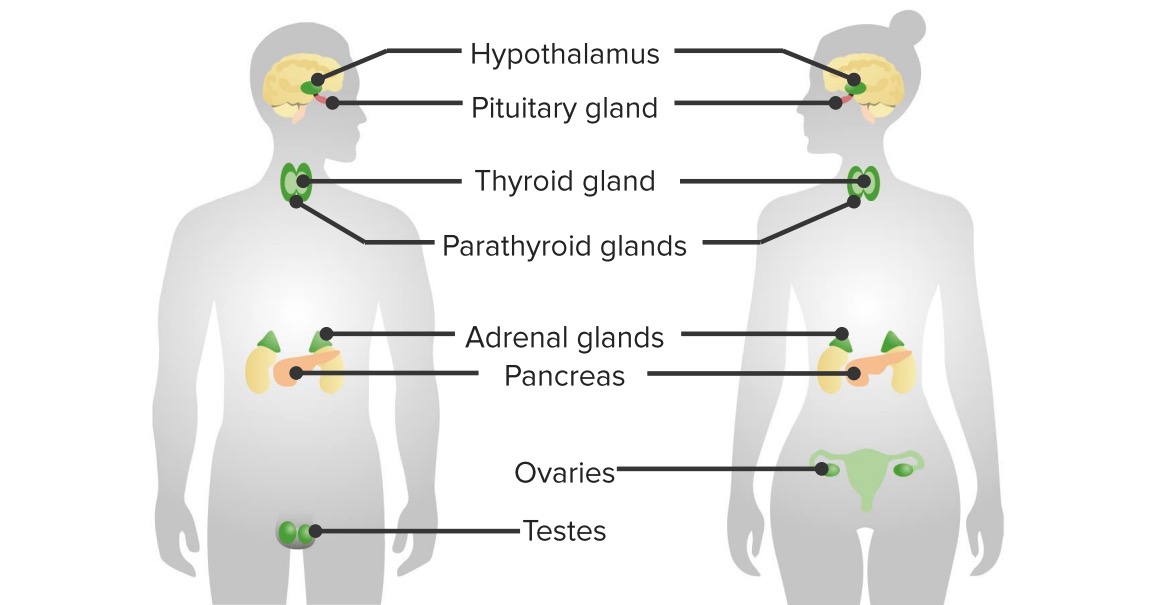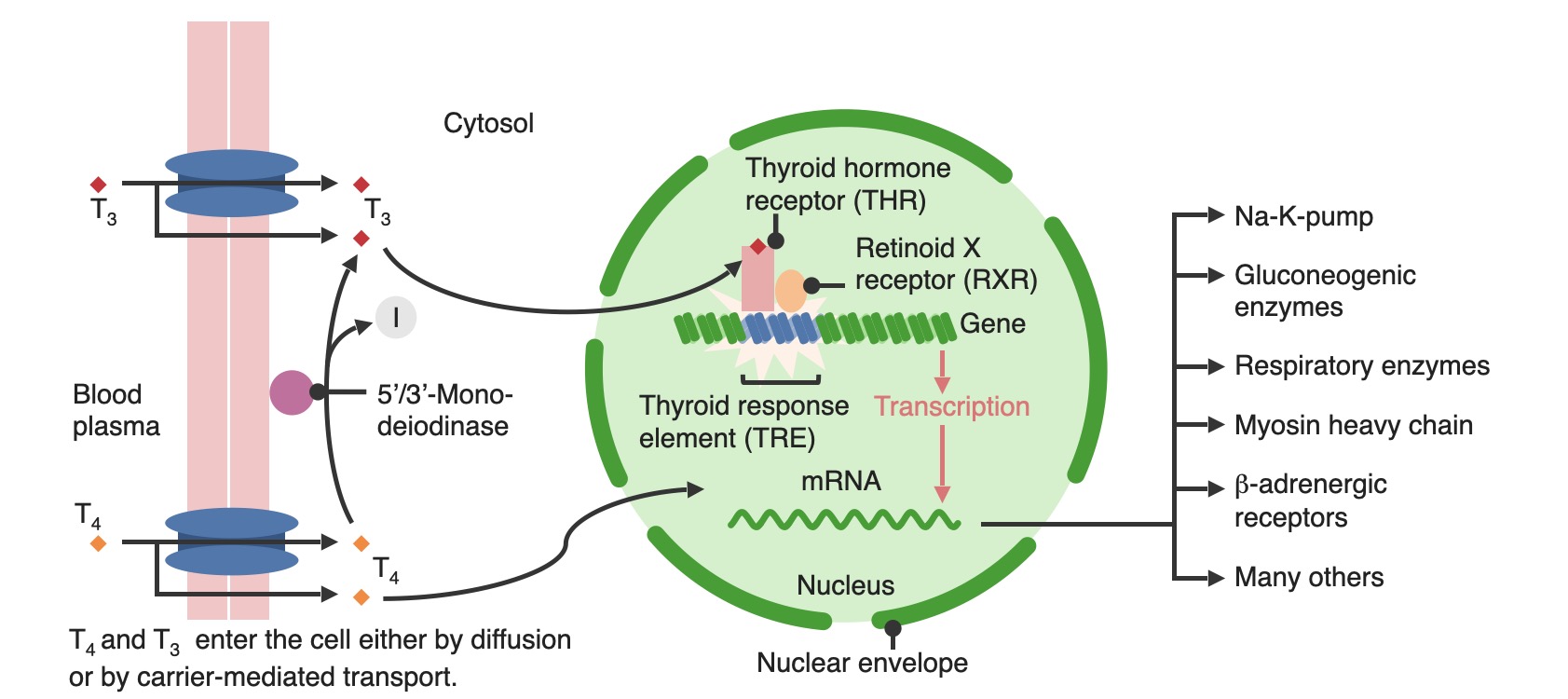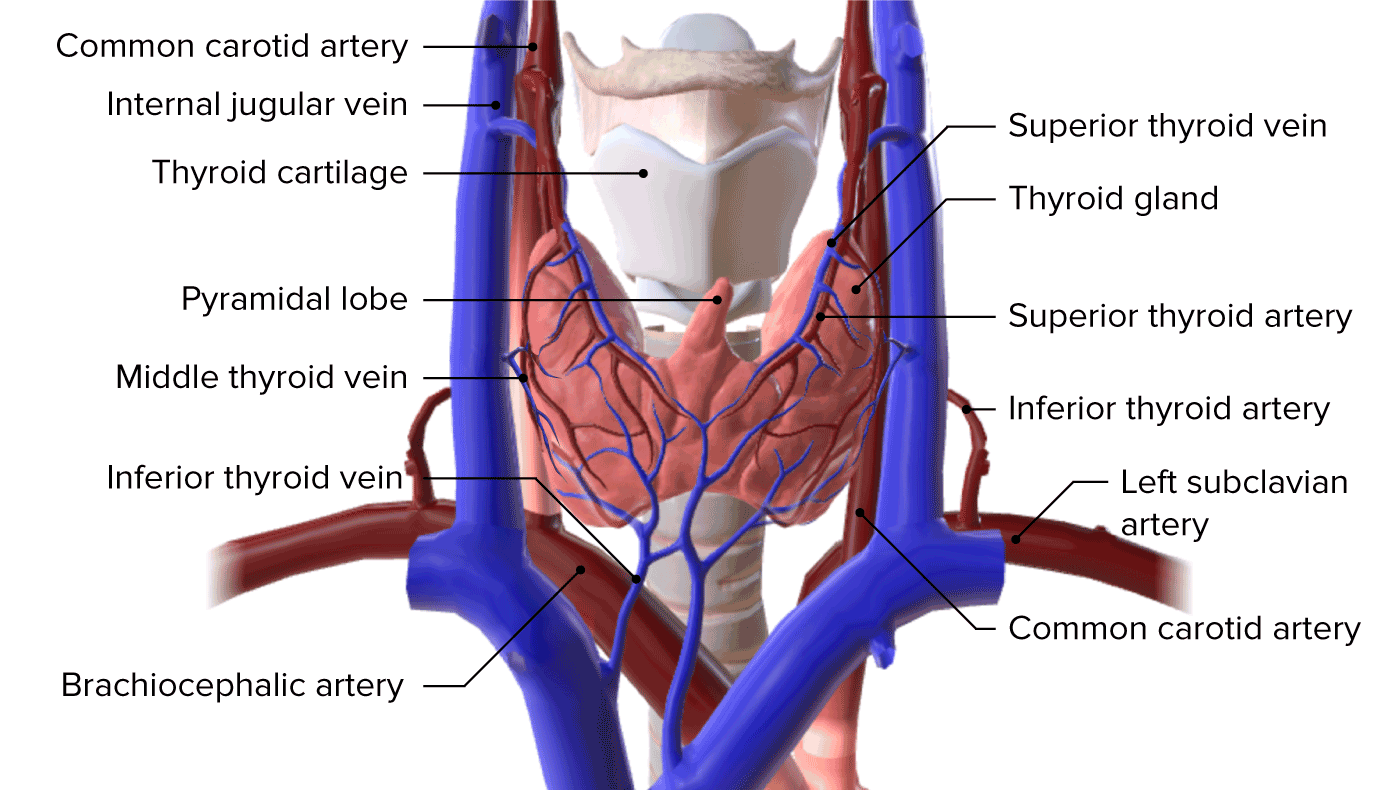Playlist
Show Playlist
Hide Playlist
Thyroid Hormones
-
Slides Thyroid Endocrine System.pdf
-
Download Lecture Overview
00:00 So what are the thyroid hormones that are the most important. 00:04 We talked about T4. 00:07 And how they named T4 is that it has 4 iodines on it. 00:11 T3 only has 3 iodines. 00:16 There is a reverse T3 in which the three iodines are bound in a little different format. 00:23 But it is not biologically active. 00:25 So we mainly talk about T3 and T4 formation. 00:29 There are few other intermediates. 00:32 There is a mono-iodinated-tyrosine and a di-iodinated-tyrosine. 00:38 And these are part of the synthesis process rather than the end hormone. 00:45 Thyroid hormone synthesis. 00:50 To be able to synthesis thyroid hormones, you need to make sure you have iodine. 00:56 Iodine needs to be present in the right place. 00:59 And that right place is in the colloid. 01:02 To be able to get it from the blood into the cytosol, we need a specialize transport. 01:07 That transporter is abbreviated NIS, which is the sodium iodine symporter. 01:15 It will move these in as co-transported molecules. 01:19 Now you may ask where does the iodine comes from. 01:23 It comes from your diet. 01:24 A person intakes iodine as part of your normal diet. 01:29 It is one of your required minerals. 01:31 Now you may have heard that you can have of course iodine deficiencies. 01:37 This is less likely to occur in many countries. 01:41 Because we iodinate salt. 01:43 And if you intake enough salt, usually you'll get enough iodine. 01:49 For this process though it is a weight limiting step. 01:53 Mean you need to have a certain amount of iodine in the blood. 01:57 And you also need to have a thyroid stimulated hormone to engage this particular transporter. 02:04 So now let's get the iodine through into the cytosol. 02:09 We have iodine and we're going to talk about it in one form which is called iodide. 02:16 Iodide is just the singular form. 02:20 Iodide will travel through a specific transporter and that's transporter is known as a pendrin channel. 02:30 It will go through that channel and as it travels through, it will be acted on by TPO. 02:40 TPO is a very specialized enzyme that uses oxygen and it actually changes the form of iodine into something that you can now attach to a specific protein. 02:58 That specific protein is known as thyroglobulin. 03:02 TG is a protein that's made within the follicular cell cytosol, transported out into the colloid. 03:11 Now you have a molecule that has the ability to bind TG. 03:18 TPO facilitates the conversion of TG and iodine. 03:24 This forms MITs and DITs. 03:28 MITs have one iodine. 03:32 DITs have two. 03:34 And that is what this process is doing is to make either one or two iodines. 03:41 TPO is a very specialized enzyme. 03:46 Thyroperoxidase allows for this conversion process of attachment. 03:54 This forms iodines placed which is known as iodination. 03:59 Now you could also take your MITs and DITs and put them together. 04:06 Because we're going to release T3 and T4. 04:09 Right now all we have is basically T1 and T2. 04:13 We need to add them together. 04:15 TPO helps us to do that step as well. 04:18 It's called the conjugation. 04:21 You add either in MIT plus a DIT to get a T3. 04:27 Or you take two DITs to form T4. 04:31 The T3, T4 is then brought back into the follicular cell. 04:39 It does that by an endocytotic process. 04:42 Often involving a megalin receptor. 04:45 This process then the vesicle that buds off forms into a lysosome. 04:52 A lysosome then has enzymes in it that help liberate the T3 and T4. 04:59 So that they will be able to be secreted into the blood. 05:03 It's this final secretion step that is important. 05:07 You need to get the T3, T4 out of the follicular cell into the blood for it to travel around the body to do all the numerous effects that thyroid hormones do.
About the Lecture
The lecture Thyroid Hormones by Thad Wilson, PhD is from the course Endocrine Physiology.
Included Quiz Questions
In the process of thyroid hormone synthesis, which process is catalyzed by the thyroid peroxidase?
- Conjugation
- Iodide entry into the follicular cell
- Thyroglobulin production
- Iodine recycling
Which of the following minerals is essential for thyroid hormone synthesis?
- Iodine
- Chloride
- Calcium
- Iron
- Sodium
What other ion is co-transported with iodine into thyroid follicular cells during thyroid hormone synthesis?
- Sodium
- Chloride
- Potassium
- Magnesium
- Calcium
Customer reviews
3,7 of 5 stars
| 5 Stars |
|
1 |
| 4 Stars |
|
1 |
| 3 Stars |
|
0 |
| 2 Stars |
|
1 |
| 1 Star |
|
0 |
Vino todo lo que me preguntaron en el examen muchas gracias
"To be able to synthesis thyroid hormone". - Mini-lecture dialogue
Good lecture but the text below or in captions is the wrong text!






